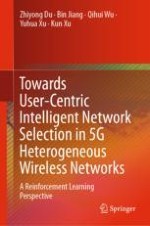2020 | OriginalPaper | Buchkapitel
7. Exploiting User Demand Diversity: QoE Game and MARL Based Network Selection
verfasst von : Zhiyong Du, Bin Jiang, Qihui Wu, Yuhua Xu, Kun Xu
Erschienen in: Towards User-Centric Intelligent Network Selection in 5G Heterogeneous Wireless Networks
Verlag: Springer Singapore
Aktivieren Sie unsere intelligente Suche, um passende Fachinhalte oder Patente zu finden.
Wählen Sie Textabschnitte aus um mit Künstlicher Intelligenz passenden Patente zu finden. powered by
Markieren Sie Textabschnitte, um KI-gestützt weitere passende Inhalte zu finden. powered by
